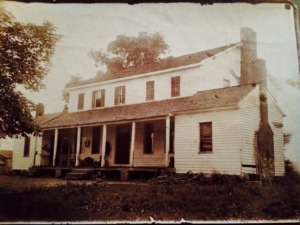
Abingdon
Sandy Watts was enslaved by the Hunter family, who lived at the Abingdon plantation along the Potomac River (now the site of Reagan National Airport). Abingdon was a major plantation whose various owners—including, for a time, George Washington’s adopted stepson John Parke Custis—enslaved people for more than a hundred years.
Alexander Hunter acquired the property in the 1830s and lived there until his death in 1849. He willed the property to his six-year-old nephew, also named Alexander Hunter, the son of his brother Bushrod W. Hunter, who was to oversee Abingdon until his son came of age. In an 1850 inventory of the elder Alexander Hunter’s estate, Sandy Watts is listed as being over age 50, suggesting that he was born in the late 1700s. Besides Sandy, the inventory lists 21 additional enslaved people ranging in age from 2 to about 70, including a child of 12 named Sandy (perhaps Sandy Watts’s son?). With the start of the Civil War in spring 1861, Bushrod and Alexander Hunter left home to fight for the Confederacy, and Union troops camped on the Abingdon property.
Though little is known about the fate of Sandy Watts and the other enslaved people during the war, Sandy made appearances in two memoirs published decades later by the younger Alexander Hunter. In his 1908 book Huntsman in the South, Hunter recounted a childhood misadventure when he and three other boys fell off a boat into icy water. “In our rush for safety we came upon Sandy, or ‘Crutch,’ as we called him, because he was lame and limped along with a pair of wooden supports of his own manufacture. . . . When Sandy’s eyes fell on the four naked figures, . . . skimming over the frozen ground, he was so amazed that he was dumb; but in a trice he threw back his head, opened his cavernous mouth, and emitted such a roar that it was echoed back from the Maryland shore. He laughed so hard that he would have fallen had he not braced himself with his crutches.”
Sandy was sometimes tasked with going down to the river to shoot ducks for one of the Hunter family’s dinner parties. Hunter described how Sandy and his helper would fool the ducks: “When about a hundred yards from the river, Sandy and his companion would advance in single file to the tree, the ducks slowly swimming out into deep water. When the tree was reached Sandy would hide behind the trunk, and his companion would walk back homeward, and the wild-fowl seeing the coast clear, would swim back to the feeding-grounds. When the flock was well bunched Sandy would let loose both barrels with deadly effect, and then he would hurry to his cabin, shove off in his skiff, collect the dead ducks and shoot the crippled ones. The wild-fowl never caught on to this game; but they were rarely shot at, for the slaves were not allowed to keep firearms.”
In the 1904 book Johnny Reb and Billy Yank, Hunter wrote about sneaking into Washington, DC, with a friend after the Civil War had started, when travel between Virginia and the capital was closed off: “Where there’s a will there’s a way. We donned citizen’s dress and went to a certain farm three or four miles above Alexandria (of which I was the prospective owner), where a row boat was kept, and bribed the gardener, old Uncle Sandy, to row us to Washington.” Although Hunter doesn’t mention it, it seems likely that Sandy rowed the two men back to Virginia after they had finished their stroll around downtown and visit to the Willard Hotel.
In 1864 the federal government confiscated the estate, though after the war Alexander Hunter sued and regained ownership of the property. The ruins of the house remain on the grounds of Reagan National Airport. Nothing more is known, however, about Sandy Watts and the other enslaved people of Abingdon.


